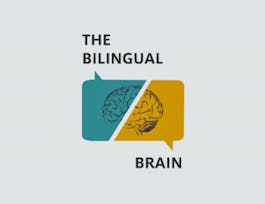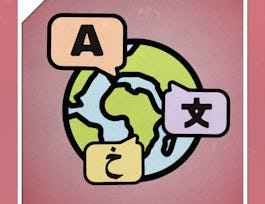Everywhere, every day, everybody uses language. There is no human society, no matter how small or how isolated, which does not employ a language that is rich and diverse. This course introduces you to linguistics, featuring interviews with well-known linguists and with speakers of many different languages. Join us to explore the miracles of human language!


Miracles of Human Language: An Introduction to Linguistics
Taught in English
Some content may not be translated
200,510 already enrolled
(2,365 reviews)
Skills you'll gain
Details to know

Add to your LinkedIn profile
7 quizzes
See how employees at top companies are mastering in-demand skills


Earn a career certificate
Add this credential to your LinkedIn profile, resume, or CV
Share it on social media and in your performance review

There are 6 modules in this course
In this first week, we will try to determine what makes language human: why do (almost) all human beings have a language, and what makes human language different from animal communication systems? We will furthermore discuss the many different places where linguists work, and the many different methodologies that they use for conducting their research. You will moreover get to know all the other participants in this MOOC: my students Inge and Marten, as well as the speakers of six different languages. Finally, don't forget to watch our first expert interview: Marten and Inge have talked with Dr. Victoria Nyst of Leiden University, who has enlightened us in the fascinating world of sign languages! For the assignments with the support of Ethnologue, please make sure to study the instructions listed in 'required and optional readings' of this module.
What's included
15 videos6 readings1 quiz5 discussion prompts1 plugin
In this module we will delve into what appear to be the smallest building blocks of spoken language: 'sounds'. As we will see however, all is not what it seems, as we will in fact encounter an even smaller building block of language, a true atom. Another interesting thing about this module is that as of this week our 6 informants will all only speak their own language. Naturally, there is also an interview with my very special friend Prof. dr. Claartje Levelt, whom I have announced before.
What's included
13 videos1 reading1 quiz1 discussion prompt
In this module we will discuss words and sentences. All languages have them; but as I will illustrate, they can be organized in very different ways in different languages. I will furthermore demonstrate what cupcakes have in common with words in a sentence. This module's interview is with one of the most cited and re-knowned linguists alive, Prof. Noam Chomsky! Finally, our 6 language informants will provide us with information about the word order in their languages.
What's included
14 videos1 reading1 quiz1 peer review2 discussion prompts
This module deals with a topic which many of you find very interesting: meaning. How do we determine what a word means? To what extent does our language influence our thinking? How can we change the world with language? As usual, we also have an additional interview with an expert of the current module's theme: in this module Barend Beekhuizen talks to Inge and Marten about his work as a Leiden PhD student in computational linguistics.
What's included
13 videos2 readings1 quiz2 discussion prompts
This module features all of the well-known parts of the current MOOC. Informants tell us about speech errors in their native tongue, I discuss everyday mistakes with my students Marten and Inge, and we have an interview with Prof. Niels Schiller of Leiden University. He discusses with us his own research among others. We moreover go on a little outing, to see linguists in their natural habitat! Furthermore, thanks to our friends at 'Babel, -The Language Magazine' we have some interesting reading for you. For example, linguist Jörg Schwyter tells us all about how he had to deal with aphasia, and how that has influenced him as a multilingual speaker.
What's included
11 videos2 readings1 quiz2 discussion prompts
In the previous modules we have dissected the structure of languages, but now we will study language in its real context: how does language change? How do people use language to be polite? Our informants are demonstrating their acting skills, and furthermore we have an interview with Prof. Adele Goldberg! She presents us with an alternative view of language, compared to the one as previously discussed by Prof. Chomsky in the third module.
What's included
13 videos1 reading2 quizzes1 peer review2 discussion prompts
Instructor

Recommended if you're interested in Other Languages

Universiteit Leiden

University of Houston

Universitat Autònoma de Barcelona

University of Pennsylvania
Why people choose Coursera for their career




Learner reviews
Showing 3 of 2365
2,365 reviews
- 5 stars
79.12%
- 4 stars
15.08%
- 3 stars
3.38%
- 2 stars
1.01%
- 1 star
1.39%

Open new doors with Coursera Plus
Unlimited access to 7,000+ world-class courses, hands-on projects, and job-ready certificate programs - all included in your subscription
Advance your career with an online degree
Earn a degree from world-class universities - 100% online
Join over 3,400 global companies that choose Coursera for Business
Upskill your employees to excel in the digital economy
Frequently asked questions
Access to lectures and assignments depends on your type of enrollment. If you take a course in audit mode, you will be able to see most course materials for free. To access graded assignments and to earn a Certificate, you will need to purchase the Certificate experience, during or after your audit. If you don't see the audit option:
The course may not offer an audit option. You can try a Free Trial instead, or apply for Financial Aid.
The course may offer 'Full Course, No Certificate' instead. This option lets you see all course materials, submit required assessments, and get a final grade. This also means that you will not be able to purchase a Certificate experience.
When you purchase a Certificate you get access to all course materials, including graded assignments. Upon completing the course, your electronic Certificate will be added to your Accomplishments page - from there, you can print your Certificate or add it to your LinkedIn profile. If you only want to read and view the course content, you can audit the course for free.
You will be eligible for a full refund until two weeks after your payment date, or (for courses that have just launched) until two weeks after the first session of the course begins, whichever is later. You cannot receive a refund once you’ve earned a Course Certificate, even if you complete the course within the two-week refund period. See our full refund policy.



